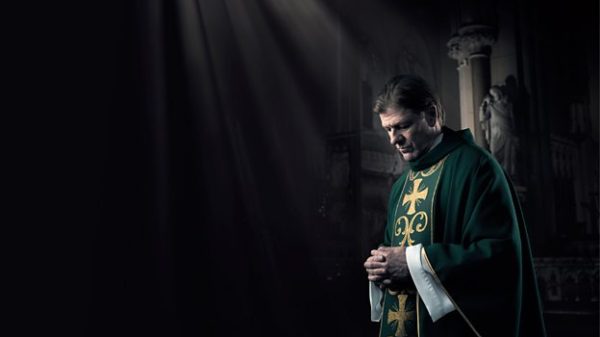The seemingly contradictory nature of deep religion versus personal responsibility has always fascinated me. If everything happens for a reason then why do so many things cause us anger and pain? Is it simply a test from God to rise above these feelings, or – as posited in this episode – an invitation to target those who cause suffering in the first place?
Broken is about those ideas of faith and accountability, and how the two interact and intersect in the lives of ordinary people. For many of us, the image of these families dressing their daughters in white or treating their local priest like a treasured family friend and mentor wrapped in one is rather alien, but it’s a fascinating world painted as tangible and worthy by the show’s writing.
A series about a troubled priest (which is honestly the most succinct yet reductive description I could come up with when asked what I was watching) might be expected to end with said man either renouncing his faith entirely or coming again to God through a series of epiphanies. Neither happens in this episode and, while I’d say it’s one of the weaker episodes of the show on the whole, it still refuses to hand us clear platitudes.
The hour deals with the aftermath of what has come before, whether it’s the bereft family of Roz Demichelis or the inquest into the death of Vernon. Both stories have bittersweet endings, if you call them endings at all, and we get the sense that these people, as enveloped in grief as they are, will continue on with the help of this community so richly drawn over the course of the show.
It’s a shame that this series of Broken appears to be the only one we’ll get, because it’s a format that would work perfectly as a yearly round of adventures, maybe as more of an ensemble piece going forwards. But at the same time it’s Bean’s performance that has really elevated the show and kept viewers so emotionally gripped, and this finale more or less ties up his story with as much hope as it can muster.
The first half of the run was more successful than the second, with Father Michael’s campaign against the betting shops and confrontation with his own homophobia both handled with less finesse than what came before. While his dubbing of Chloe’s vandalism as ‘righteous anger’ and the town’s subsequent rallying cry are fun moments, it just doesn’t compare to the pitch black nuance of those first two or three hours.
But as heavy handed as some of the subject matter turned out to be, it’s counteracted by both the strong thematic undercurrent and Sean Bean’s stunning performance at the center. A tapestry of pain and suffering weaving in and out of people’s lives with – much like this community – just one constant.
At times the series feels deliberately alienating, diving straight into such taboo topics as modern religion, abuse in the church and the misery of the working class. Even Roz’s suicide was handled much differently than we’re used to seeing on screen – not something done in a moment of passion but a desperate, carefully planned need to avoid the shame of bad choices and a life wasted.
As such, Broken was perhaps one of the best political commentaries on television this year, showing us those abstract ‘just about managing’ families we hear about on the news in stark and devastating colour. Yet somehow, in the midst of such heavy stuff, the show feels unexpectedly warm and safe. Father Michael is a flawed man with as much shame and regret as his congregation, but in the end faith overcomes all, and much is forgiven as long as we welcome it.

